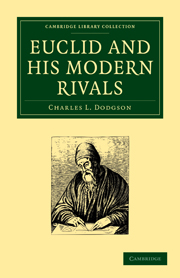Book contents
- Frontmatter
- PROLOGUE
- Contents
- Act I
- Act II
- Act III
- ACT IV
- Appendices
- I Extract from Mr. Todhunter's essay on ‘Elementary Geometry,’ included in ‘The Conflict of Studies, &c.’
- II Extract from Mr. De Morgan's review of Mr. Wilson's Geometry, in the ‘Athenæum’ for July 18, 1868
- III The enunciations of Tables I—IV, stated in full: with references to the various writers who have assumed or proved them
- IV The various methods of treating Parallels, adopted by Euclid and his Modern Rivals
- V Proof that, if any one proposition of Table II be granted as an Axiom, the rest can be deduced from it
II - Extract from Mr. De Morgan's review of Mr. Wilson's Geometry, in the ‘Athenæum’ for July 18, 1868
Published online by Cambridge University Press: 29 August 2010
- Frontmatter
- PROLOGUE
- Contents
- Act I
- Act II
- Act III
- ACT IV
- Appendices
- I Extract from Mr. Todhunter's essay on ‘Elementary Geometry,’ included in ‘The Conflict of Studies, &c.’
- II Extract from Mr. De Morgan's review of Mr. Wilson's Geometry, in the ‘Athenæum’ for July 18, 1868
- III The enunciations of Tables I—IV, stated in full: with references to the various writers who have assumed or proved them
- IV The various methods of treating Parallels, adopted by Euclid and his Modern Rivals
- V Proof that, if any one proposition of Table II be granted as an Axiom, the rest can be deduced from it
Summary
The Schools' Inquiry Commission has raised the question whether Euclid be, as many suppose, the best elementary treatise on geometry, or whether it be a mockery, delusion, snare, hindrance, pitfall, shoal, shallow, and snake in the grass.
We pass on to a slight examination of Mr. Wilson's book. We specially intend to separate the logician from the geometer. In the author's own interest, and that he may be as powerful a defender as can be of a cause we expect and desire to see fully argued, we recommend him to revise his notions of logic. We know that mathematicians care no more for logic than logicians for mathematics. The two eyes of exact science are mathematics and logic : the mathematical sect puts out the logical eye, the logical sect puts out the mathematical eye ; each believing that it sees better with one eye than with two. The consequences are ludicrous. On the one side we have, by confusion of words, the great logician Hamilton bringing forward two quantities which are ‘one and the same quantity,’ Breadth and Depth, while, within a few sentences, ‘the greater the Breadth, the less the Depth.’ On the other side, we have the great mathematician, Mr. Wilson, also by confusion of words, speaking of the ‘invariably syllogistic form of his [Euclid's] reasoning,’ and, to show that this is not a mere slip, he afterwards talks of the ‘detailed syllogistic form’ as a ‘source of obscurity to beginners, and damaging to trne geometrical freedom and power.’
- Type
- Chapter
- Information
- Euclid and His Modern Rivals , pp. 221 - 226Publisher: Cambridge University PressPrint publication year: 2009First published in: 1879



